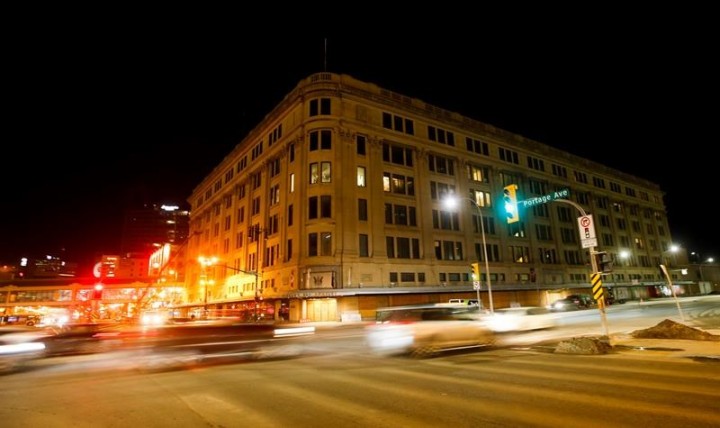WINNIPEG — North America’s oldest company with fur-trading roots is transferring what was one of its flagship stores to a First Nations group in what is being praised as an example of reconciliation in action.
Animal pelts, blankets and other items were exchanged in a lengthy ceremony Friday marking the handover of the Hudson’s Bay Co. building in Winnipeg. Prime Minister Justin Trudeau, Manitoba Premier Heather Stefanson and chiefs from across southern Manitoba attended.
“Today’s announcement is about more than just a building. It’s actually about rebuilding — rebuilding trust, rebuilding landmarks, rebuilding relationships,” Trudeau said.
Richard Baker, the company’s governor and executive chairman, acknowledged Hudson’s Bay’s involvement in colonialism.
“The impact of our company’s history is not at all lost on me and is part of the reason we are all here today,” Baker said.
“We must meet our words with actions. This is why I know that this (agreement) is the right one.”
The Southern Chiefs’ Organization, which represents 34 First Nations communities, is to take over the former store, which opened in 1926 and closed in 2020.
Grand Chief Jerry Daniels said repurposing the building is a major turning point.
“We’re turning the page (on) what reconciliation means and … Baker is showing leadership. I hope that the rest of the country follows his lead,” Daniels said.
The six-storey, 60,000-square-metre building is to be transformed to include almost 300 affordable housing units, a child-care centre, a museum, an art gallery and restaurants.
There are also plans for a health centre offering western and traditional medicine, a governance office for the 34 First Nations and a place of reflection to honour victims of residential schools.
The federal government is putting up $65 million in a combination of forgivable and low-interest loans. The Manitoba government is offering $10 million for the housing project and access to a previously announced $25-million fund to help preserve and restore the historic building.
Winnipeg is also considering a financial contribution that would probably include tax breaks, but details have not yet been worked out.
HBC, now a holding company with real estate, department stores and e-commerce operations, started in 1670 as a fur- trading business. Its complex history is closely tied to colonial expansion, as it established an exclusive and exploitative trading monopoly with Indigenous Peoples.
The fur trade created a reliance on European-made goods and introduced diseases that devastated Indigenous populations.
The company also claimed sovereignty over much of the land, which it sold to the government of Canada after Confederation as the company increased focus on retail expansion.
“The Hudson’s Bay Co. has made a lot of money through dispossession in Western Canada,” said Sean Carleton, assistant professor of history and Indigenous studies at the University of Manitoba.
“The store downtown … is kind of a symbol of that.”
The Winnipeg building — one of the company’s “original six” flagship department stores — had been in decline for many years.
It received heritage designation in 2019 but a valuation that same year found the building was worth $0 due to the significant investment needed. HBC closed the store for good in November 2020.
A major hurdle for any new development is that the building dates back almost a century, has a heritage status that limits certain renovations and needs major work to bring it up to code.
Baker said HBC had received proposals from six different groups to take over the property.
“During the pandemic when the world was on pause, we were able to get a proposal from the (Southern Chiefs’ Organization) and hear their vision. And their vision felt like the right way forward.”
The project’s working title is Wehwehneh Bahgahkinahgohn, or “it is visible.”
This report by The Canadian Press was first published April 22, 2022.
— With files from Kelly Geraldine Malone in Winnipeg and Brett Bundale in Halifax
The Canadian Press
Related


































